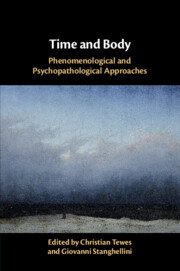Book contents
- Time and Body
- Endorsements for Time and Body
- Time and Body
- Copyright page
- Dedication
- Additional material
- Contents
- Figures
- Contributors
- 1 Introduction – Time and Body
- 2 Time, the Body, and the Other in Phenomenology and Psychopathology
- Part I Body and Time: General Aspects
- Part II Grief and Anxiety
- Part III Borderline Personality and Eating Disorders
- Part IV Depression, Schizophrenia, and Dementia
- 13 Intrinsic Temporality in Depression
- 13.1 Commentary on “Intrinsic Temporality in Depression: Classical Phenomenological Psychiatry, Affectivity, and Narrative”
- 14 Lost in the Socially Extended Mind
- 14.1 Commentary on “Lost in the Socially Extended Mind: Genuine Intersubjectivity and Disturbed Self-Other Demarcation in Schizophrenia”
- 15 Closing Up
- 15.1 Commentary on “Closing Up: The Phenomenology of Catatonia”
- 16 Embodied Selfhood and Personal Identity in Dementia
- 16.1 Commentary on “Embodied Selfhood and Personal Identity in Dementia”
- Index
- References
16.1 - Commentary on “Embodied Selfhood and Personal Identity in Dementia”
A Lifeworld Account of Personal Identity
from Part IV - Depression, Schizophrenia, and Dementia
Published online by Cambridge University Press: 30 October 2020
- Time and Body
- Endorsements for Time and Body
- Time and Body
- Copyright page
- Dedication
- Additional material
- Contents
- Figures
- Contributors
- 1 Introduction – Time and Body
- 2 Time, the Body, and the Other in Phenomenology and Psychopathology
- Part I Body and Time: General Aspects
- Part II Grief and Anxiety
- Part III Borderline Personality and Eating Disorders
- Part IV Depression, Schizophrenia, and Dementia
- 13 Intrinsic Temporality in Depression
- 13.1 Commentary on “Intrinsic Temporality in Depression: Classical Phenomenological Psychiatry, Affectivity, and Narrative”
- 14 Lost in the Socially Extended Mind
- 14.1 Commentary on “Lost in the Socially Extended Mind: Genuine Intersubjectivity and Disturbed Self-Other Demarcation in Schizophrenia”
- 15 Closing Up
- 15.1 Commentary on “Closing Up: The Phenomenology of Catatonia”
- 16 Embodied Selfhood and Personal Identity in Dementia
- 16.1 Commentary on “Embodied Selfhood and Personal Identity in Dementia”
- Index
- References
Summary
The question of personal identity is of considerable societal importance. Its importance becomes particularly clear when discussing the experience of patients with terminal Alzheimer's dementia (P-TAD). Can such patients still be considered as persons even though they have forgotten essential facts about their lives? Is being a person compatible with the key symptoms of advanced Alzheimer's dementia (AD)?
- Type
- Chapter
- Information
- Time and BodyPhenomenological and Psychopathological Approaches, pp. 390 - 395Publisher: Cambridge University PressPrint publication year: 2020



